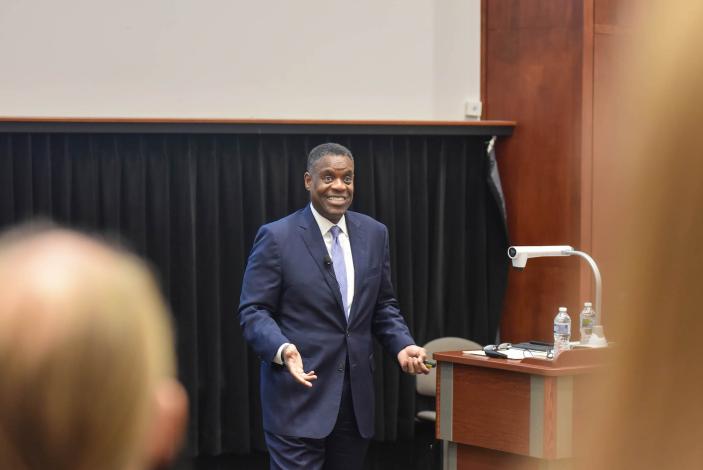
School of Accountancy hosts Orin Ethics Symposium, featuring Kevyn D. Orr, architect of the nation’s largest municipal bankruptcy case

In 2013, Kevyn D. Orr stepped down as a restructuring expert at the global law firm Jones Day to become the City of Detroit’s newest emergency manager. His mission: save the Motor City from financial collapse.
Over the next two years, Orr oversaw the largest and most complicated municipal bankruptcy proceeding in the nation’s history. Today, the city enjoys balanced budgets, revenue increases and money in the bank. However, the struggle to get there was fraught with wrenching financial and ethical decisions that weren’t always easy to make but ultimately led to a renaissance of the city.
Orr, who has since returned to Jones Day as partner-in-charge of U.S. offices, talked about those challenges and the lessons he learned during the School of Accountancy’s annual Richard M. Orin Ethics Symposium on Friday, Oct. 6, at the Robert J. Trulaske, Sr. College of Business. Hundreds of students, faculty, staff and community members filled Bush Auditorium in Cornell Hall to hear Orr’s retrospective and how his decisions in Detroit were rooted in ethics.
“The challenge is keeping your true north,” Orr said, adding that some ethical dilemmas in business are simple to resolve. “You can’t steal. It’s wrong. It’s morally and ethically wrong. But there are other situations that aren’t so simple.”
For example, when facing bankruptcy, do you pay off creditors or put the money toward securing health care and pensions for retirees? This was an ethical dilemma Orr faced while resolving issues in Detroit.
Orin’s Legacy
“Those are judgement calls and all of you, because you’ll be in business, are going to have to make those calls,” he said, addressing the students.
The Orin Ethics Symposium focuses on the intersection of ethics and accounting. The annual lecture series was made possible by Richard Orin, who received a business administration degree from Mizzou in 1949. He later partnered with the Trulaske College of Business in 2002 to create the lecture series which brings in key figures in business ethics, corporate governance and regulation to raise awareness about ethics issues in accountancy, business and law.
This was the first symposium since Orin’s passing earlier this year on June 9. To mark the occasion, the Orin family dedicated a bench in his honor on the north side of Cornell Hall. His daughter, Rhonda Eisenstein, and grandsons, Eric Weissmann and Matthew Eisenstein, were in attendance.
“The four pillars of my grandfather’s life were dedication to service, commitment to family, passion for hard work and love for ethics and education,” Weissmann said. “My grandfather’s life and legacy lives on through this symposium. He would want you to know that it’s good to be right, but it is more important to do the right thing, especially when the right thing is hard.”
For generations to come
Vairam Arunachalam, director of the School of Accountancy and close friend of Orin’s, said thousands of business students have benefitted from hearing speakers like Orr over the years.
“Richard would be pleased with where the symposium is today,” Arunachalam said. “He wanted students to live lives of passion, commitment, and integrity. Kevyn’s message is especially important today.”
Abel Ambessie, a senior in accountancy, appreciated Orr’s message of upholding one’s ethical principles, no matter the circumstances being faced.
“One key takeaway for me was the critical importance of maintaining unwavering integrity and ethical standards, even in the face of challenging circumstances,” Ambessie said. “Mr. Orr’s experience as the emergency manager of Detroit during its financial crisis underscores the notion that ethical decision-making is not just a moral imperative but also a strategic one. I believe that discussing ethics in accountancy is crucial because it helps foster a culture of transparency, accountability and responsibility.”
During his tenure with Detroit, Orr helped the city successfully restructure $18 billion in debt, reduced overall debt by $7 billion, developed and implemented a multiyear $1.7 billion revitalization plan for the city services and operations, streamlined key city operations, helped improve public safety, put the city’s art in a perpetual public trust, and avoided drastic cuts to pension and related retirement benefits. Orr received the Turnaround Management Association’s Mega Transaction of the Year Award for the City of Detroit in October 2015. Upon returning to Jones Day, Orr resumed his position in the business restructuring and reorganization practice.
When reflecting on the tough decisions he’s made over the years, Orr told students to ask themselves a few simple questions: “Would your mother be proud of you? Will your children be proud of who you are?”
Samuel Bruce, a graduate student in accountancy, took Orr’s advice to heart and said he would rely on his “true north” to help guide his decision-making.
“It can be difficult to make the right ethical decision when there is lots of outside noise and influence from others that can impact your decision-making process,” Bruce said. “I learn that when a difficult situation presents itself, knowing who I am and leaning on my ‘true north’ will help guide me in making the right ethical decision, even when it may not be popular.”
